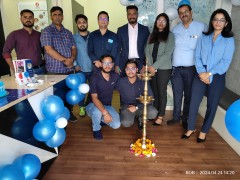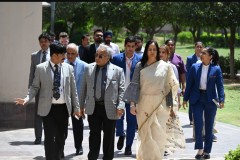- Motion Education aces the JEE exam, recording a selection ratio of 68.01%
- Mars Wrigley launches BOOMER Jelly on Top Boomer, Goes Wobbly with Bumrah for Maximum Fun
- The Shoreline Unveils Premier Co-op Apartments in New Rochelle, Redefining Luxury Living
- Vedanta FACOR and CFlo Partner for Sustainable Chrome Beneficiation in Odisha
- Authorized Economic Operator (AEO) Status Now Extended To The Gem & Jewellery Sector
- Cocobellacb.com Reveals Blooms That Last: A Guide to Selecting the Ideal Faux Floral Shop for Faux Arrangements
- Housing Guards Elevates Lumber Supplies in Oshawa with Unmatched Quality and Service
- Upcore Technologies Elevates Brand Presence with Revamped Website and Expanded Service Offerings
- Infinity Learn by Sri Chaitanya announces breakthrough results in JEE Main 2024
- Cumbria Hotels Revolutionize Guest Experience with Premier Laundry Services from Shortridge Laundry
- Summit Hotels Doubles Rewards & Offers Exclusive Perks with 'Get Rewarded More'
- Indo Korea to Foster Collaboration in Art and Culture Promotion
- Skin Health: A Priority for All Ages
- Renowned Filmmaker Rakesh Srivastava Conducts Inspiring Workshop at AAFT School of Cinema
- Alia Bhatt and Ranveer Singh Show the Way in MakeMyTrip\'s New Films
 Mail to a Friend Mail to a Friend |
|
     |
Max Hospital, Shalimar Bagh organises public session on stroke management
Stroke is one of the leading causes of mortality and lifelong disability in India attributing to around 30% of the overall morbidity. It is estimated that, in every 40 seconds someone suffers from stroke and a person dies of stroke in every four minutes globally.
With advancements in the field of treatment of stroke, patients arriving to a hospital within the window period after a stroke can not only be treated but the condition can be reversed in most cases.
North India?s leading healthcare provider, Max Super Specialty Hospital, Shalimar Bagh, New Delhi organised a public health awareness session on stroke, its symptoms and treatment options in Sonipat today.
Brain stroke is the 2nd leading cause of mortality and the leading cause of long-term disability.
Stroke is happens when blood vessels in the brain gets rupture or get blocked causing the blood supply in the brain to be obstructed.
While timely treatment can reduce the damage caused, it is important for the patients to recognise the early symptoms and get to a super hospital quickly. Thousands of stroke patients have been successfully treated at Max Hospital Shalimar Bagh, New Delhi who have arrived within the window period of 4 to 6.5 hours, thereby saving lives and preventing permanent disability.
The public session was orated by Dr Manoj Khanal ? Associate Director & Unit Head ? Neurology and Dr Shailesh Jain ? Principal Consultant ? Neuro & Spine Surgery and Neuro-Intervention at Max Hospital, Shalimar Bagh
Maintaining an active lifestyle, consuming healthy food and checking blood pressure in check can help in lowering risks of stroke.
?With the lifestyle changes and adoption of unhealthy habits like lack of physical exercise, smoking and excessive alcohol consumption, and new cases of stroke are likely to be seen in the younger generation of the country. In this fast pace of life advent of technology has made our life easier, but also has reduced the amount of physical activity. Due to increased stress as well as rising incidences of diabetes and hypertension, there is a sudden shift in the age bracket of developing lifestyle ailments. Regular exercise not only helps in maintaining the overall health but also keeps at bay a list full of diseases. There are lot of ways to stay active, even if you find difficult to move around,? Said Dr Manoj Khanal, Associate Director & Unit Head ? Neurology, Max Hospital Shalimar Bagh, New Delhi.
Every year an estimated 16 lakh Indians suffer brain stroke, with a mortality rate of over 6 lakhs, and out of those who survive, around 45% of them have to cope up with serious permanent impairment. Stroke is no longer a disease of elderly. Over 20-30% of all stroke cases in India occurs in people under the age bracket of 45 years.
?Outcome of acute stroke depends primarily on the initiation time of treatment, thus making early arrival of the patients to the hospital as one of the most vital factors. This means early identification and awareness of stroke is important. Patients arriving within the window period after a stroke can not only be treated but the condition can be reversed in most cases. Being, minimally invasive, stroke thrombectomy is an established first line of emergency treatment which is highly effective and safe. The treatment restores blood flow to the brain by opening blocked arteries with catheter-based devices introduced through groin or wrist arteries and saves brain tissue from permanent damage,? Said Dr Shailesh Jain ? Principal Consultant ? Neuro & Spine Surgery and Neuro - Intervention, Max Hospital Shalimar Bagh, New Delhi.
There is a need to spread awareness about the symptoms of stroke -- facial drooping, arm weakness and speech difficulties -- and importance of timely intervention should be made more prominent among the masses. Delay of every minute in seeking the right treatment can cause significant damage to the brain. The golden window period to arrive to a stroke unit should be within six hours of stroke attack, delaying which would lead to irreversible damage causing permanent disability in around 80% of the cases.
Stressing on the need for stroke patients to reach a super speciality hospital, Dr Khanal said: ?Stroke is treatable. Early recognition of symptoms and reaching the right hospital makes a big difference in the treatment outcome. We encourage the public to recognize and learn the signs of stroke ? BEFAST (Balance problems; Eye problems leading to vision loss; Face drooping; Arm weakness; Speech slurred; Time to call an ambulance) and take immediate action.
Company :-CNN Media Services
User :- Gauri Chhabra
Email :-gauri.cnpr@gmail.com
Mobile:- + 91 8287594752
Other articles by Max Hospital











